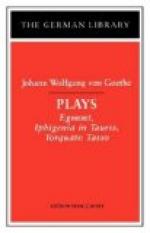Egmont. You, my lord, should know better than I, that tranquillity is already sufficiently restored, and was still more so, till the appearance of fresh troops again agitated the public mind, and filled it anew with anxiety and alarm.
Alva. You seem to intimate that it would have been more advisable if the king had not placed me in a position to interrogate you.
Egmont. Pardon me! It is not for me to determine whether the king acted advisedly in sending the army hither, whether the might of his royal presence alone would not have operated more powerfully. The army is here, the king is not. But we should be most ungrateful were we to forget what we owe to the Regent. Let it be acknowledged! By her prudence and valour, by her judicious use of authority and force, of persuasion and finesse, she pacified the insurgents, and, to the astonishment of the world, succeeded, in the course of a few months, in bringing a rebellious people back to their duty.
Alva. I deny it not. The insurrection is quelled; and the people appear to be already forced back within the bounds of obedience. But does it not depend upon their caprice alone to overstep these bounds? Who shall prevent them from again breaking loose? Where is the power capable of restraining them? Who will be answerable to us for their future loyalty and submission? Their own goodwill is the sole pledge we have.
Egmont. And is not the good-will of a people the surest, the noblest pledge? By heaven! when can a monarch hold himself more secure, ay, both against foreign and domestic foes, than when all can stand for one, and one for all?
Alva. You would not have us believe, however, that such is the case here at present?
Egmont. Let the king proclaim a general pardon; he will thus tranquillize the public mind; and it will be seen how speedily loyalty and affection will return, when confidence is restored.
Alva. How! And suffer those who have insulted the majesty of the king, who have violated the sanctuaries of our religion, to go abroad unchallenged! living witnesses that enormous crimes may be perpetrated with impunity!
Egmont. And ought not a crime of frenzy, of intoxication, to be excused, rather than horribly chastised? Especially when there is the sure hope, nay, more, where there is positive certainty that the evil will never again recur? Would not sovereigns thus be more secure? Are not those monarchs most extolled by the world and by posterity, who can pardon, pity, despise an offence against their dignity? Are they not on that account likened to God himself, who is far too exalted to be assailed by every idle blasphemy?
Alva. And therefore, should the king contend for the honour of God and of religion, we for the authority of the king. What the supreme power disdains to avert, it is our duty to avenge. Were I to counsel, no guilty person should live to rejoice in his impunity.




